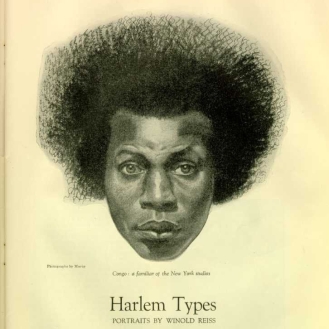Mental Health and Modern American Literature, 1890-1955

First page to “Harlem Types” portraiture by Winold Reiss. Survey Graphic, March 1, 1925, 651.
Pathologies of Character explores a sea change in US cultural understandings of mental life in the 65 years leading up to the publication of the first Diagnostic and Statistical Manual of Mental Disorders (DSM) in 1952. This book project argues that psychological diagnosis drives literary innovation in these years. Modernist writers both adopt and resist emerging scientific models of psychopathology in imagining their characters. Modernist authors crucially depart from their clinical counterparts, however, when they dramatize the detrimental consequences of such frameworks for women, sexual minorities, and non-white subjects. I establish how four such clinical types inspire modernist writers to reinvent the aesthetics of literary character. Participating in recent debates in the health humanities and engaging ongoing studies of intersectional identity, I rethink how race, gender, class, and sexuality shape schemas of wellness and disorder, while also revealing how narrative form unsettles clinical definitions of illness.
An introductory gloss of the project appears in American Literary History‘s Second Book Project special issue. Modernism/modernity published a version of the chapter on race and addiction in Harlem Renaissance-era literature and early genetic theory. Arizona Quarterly published a version of the chapter on ambivalence, from its origin as a psychotic symptom of schizophrenia to its transition to a mainstream neurosis associated with young women and homosexuals and an esteemed hallmark of masculine modernist style. Another occasional piece, on the prehistory of the contemporary quantified self movement, appeared in Modernism/modernity’s online feature In These Times. Also for Modernism/modernity, Heather A. Love and I co-edited a related Print+ essay cluster on “Modernism & Diagnosis.” With Gordon Hutner, I co-edited a special issue of American Literary History on “Diagnosing America.”
Research for this book has been supported by a long-term fellowship at The Huntington Library, a travel grant from the Modernist Studies Association, and a travel award from the Society for Literature, Science, and the Arts and the US National Science Foundation.
You must be logged in to post a comment.